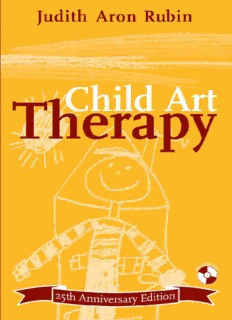
25th Anniversary Edition PDF
Preview 25th Anniversary Edition
Child Art Therapy 25th Anniversary Edition Judith Aron Rubin John Wiley & Sons, Inc. Child Art Therapy Child Art Therapy 25th Anniversary Edition Judith Aron Rubin John Wiley & Sons, Inc. This book is printed on acid-free paper. o Copyright © 2005 by John Wiley & Sons, Inc. All rights reserved. Published by John Wiley & Sons, Inc., Hoboken, New Jersey. Published simultaneously in Canada. No part of this publication may be reproduced, stored in a retrieval system, or transmitted in any form or by any means, electronic, mechanical, photocopying, recording, scanning, or otherwise, except as permitted under Section 107 or 108 of the 1976 United States Copyright Act, without either the prior written permission of the Publisher, or authorization through payment of the appropriate per-copy fee to the Copyright Clearance Center, Inc., 222 Rosewood Drive, Danvers, MA 01923, (978) 750-8400, fax (978) 646-8600, or on the web at www.copyright.com. Requests to the Publisher for permission should be addressed to the Permissions Department, John Wiley & Sons, Inc., 111 River Street, Hoboken, NJ 07030, (201) 748-6011, fax (201) 748-6008. Limit of Liability/Disclaimer of Warranty: While the publisher and author have used their best efforts in preparing this book, they make no representations or warranties with respect to the accuracy or completeness of the contents of this book and specifically disclaim any implied war- ranties of merchantability or fitness for a particular purpose. No warranty may be created or extended by sales representatives or written sales materials. The advice and strategies contained herein may not be suitable for your situation. You should consult with a professional where appropriate. Neither the publisher nor author shall be liable for any loss of profit or any other commercial damages, including but not limited to special, incidental, consequential, or other damages. This publication is designed to provide accurate and authoritative information in regard to the subject matter covered. It is sold with the understanding that the publisher is not engaged in rendering professional services. If legal, accounting, medical, psychological or any other expert assistance is required, the services of a competent professional person should be sought. Designations used by companies to distinguish their products are often claimed as trademarks. In all instances where John Wiley & Sons, Inc. is aware of a claim, the product names appear in initial capital or all capital letters. Readers, however, should contact the appropriate companies for more complete information regarding trademarks and registration. For general information on our other products and services please contact our Customer Care Department within the U.S. at (800) 762-2974, outside the United States at (317) 572-3993 or fax (317) 572-4002. Wiley also publishes its books in a variety of electronic formats. Some content that appears in print may not be available in electronic books. For more information about Wiley products, visit our website at www.wiley.com. ISBN 0-471-67991-7 (pbk.) Printed in the United States of America 10 9 8 7 6 5 4 3 2 1 Contents Illustrations xi DVD Contents xv Acknowledgments xxxiii Preface:25th Anniversary Edition xxxix Background xxxix Changes in Art Therapy and Mental Health xl Changes in Organization and Content of the Book xli PARTI The Context 1 Roots: Personal and Professional 3 Personal 3 Professional 6 Personal/Professional Passage 8 A Personal Experience of the Creative Process 9 Making Pictures Helps My Mourning Process 13 About This Book 14 2 A Framework for Freedom 19 Conditions for Creative Growth 29 3 Understanding Development in Art 34 Progression in Normal Artistic Development 34 Where a Child Is 46 General Issues in Development 48 v Contents 4 A Picture of the Therapeutic Process 57 Testing 58 Trusting 61 Risking 62 Communicating 63 Facing 64 Understanding 66 Accepting 68 Coping 69 Separating 70 5 Some Ways to Facilitate Expression 73 A Starter (A Scribble) 73 A Theme 74 A Medium 77 A Dream 78 A Mask 81 A Target 83 A Tape Recorder 85 A Poem 88 A Story 89 A Picture-Taking Machine 90 Flashlights and Candles 90 Extending the Range 92 Conclusion 92 PARTII The Individual 6 An Individual Art Evaluation 97 Background 97 Initiating the Interview 99 Getting Started 103 The Art Materials 106 The Space 110 Talking about the Artwork 113 Abstract Artwork 115 Some Things Are Easier to Say and to See in Art 117 Productivity 118 Recommendations 119 7 Decoding Symbolic Messages 121 To Write or Not to Write? 121 Verbal Communications 122 To Talk or Not to Talk? 122 vi Contents Nonverbal Communications 123 Interaction with the Therapist 123 Response to the Task 124 Response to the Materials 124 The Working Process 125 Products: Form 126 Form and Process as Content 128 Products: Content 129 Common Themes 129 Self-Representations 131 Degree of Disguise 131 Attitude toward the Product 132 Making Sense 134 Reporting 135 8 Some Case Studies 137 Ellen: An Elective Mute 138 Dorothy: A Child with Schizophrenia 145 Randy: A Boy with Encopresis 150 Conclusion 152 9 Case Illustration: Understanding and Helping 153 Individual Art Evaluation 156 Group Art Therapy 158 Joint Mother-Child Art Sessions 160 Family Art Evaluation 161 Family Art Therapy 162 Joint Nonverbal Drawing 167 PARTIII The Family and the Group 10 A Family Art Evaluation 173 Format 174 Scribble Drawing 177 Family Representations 178 Family Mural 180 Free Products 182 Making Sense 182 Characteristics 183 Modifications 185 11 Family Art Therapy 188 Family Member Dyads 188 Conjoint Family Art Therapy 193 vii
Description: